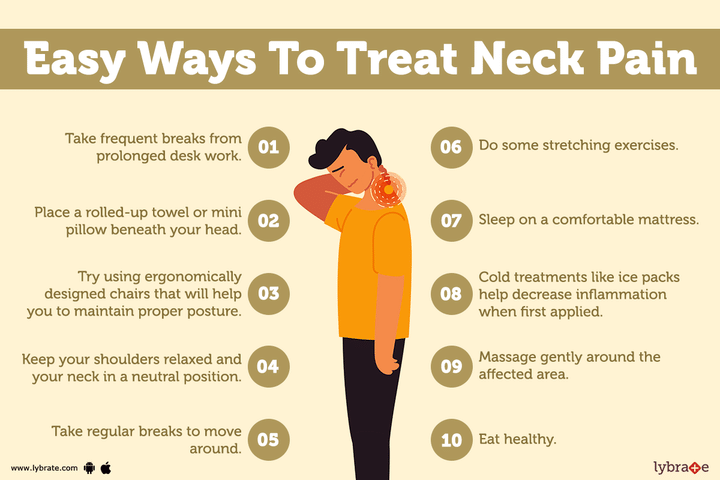12 Ways to Treat Neck Pain and Tips to Prevent Neck Pain
What is Neck Pain?
Neck pain is a common condition that causes discomfort in the neck area, which often originates from the muscles, nerves, bones, joints or other structures in the neck. Neck pain can vary from mild to debilitating depending on its cause and can be caused by any number of medical conditions.
Common causes of neck pain include muscle strain and tension, neck injuries or trauma, arthritis or disc degeneration. Treatment for neck pain may include medication, physical therapy and/or adjustments with chiropractic techniques.
Reasons of Neck Pain:
- Cervical Strain: A cervical strain is a soft tissue injury to the neck muscles, ligaments or tendons. It can involve the painful overstretching of either a muscle or ligament in the neck.
- Osteoarthritis: Osteoarthritis (OA) is a degenerative joint disease common in adults that affects the vertebrae of the cervical region and causes pain, stiffness, and oftentimes with joint mobility limitations. Common symptoms may include headache, shoulder pain, and radiating arm pain.
- Disc Injury: A disc injury or herniated disc may cause pain when one of your discs becomes compressed and bulges out from between two vertebrae in your spine due to excessive strain or pressure on the disc material.
- Whiplash: Whiplash is an injury to your neck caused by sudden forceful back-and-forth movement to it.
- Degenerative Disc Disease: Symptoms of degenerative disc disease include pain and stiffness in the neck, upper back, arms or lower back.
- Cervical Spondylosis: Cervical spondylosis is a common condition that affects your neck’s vertebrae and discs and can cause pain, stiffness, and many other symptoms. It’s also called neck arthritis.
- Kyphoscoliosis: Kyphoscoliosis is a condition that involves a curvature in both the upper and lower spine, or in some cases, just the upper or lower spine. It can cause pain, discomfort, and other symptoms.
What are the signs and symptoms of Neck Pain?
The signs and symptoms of Neck Pain vary widely, depending on the cause, but can include:
- Pain in the neck, which can range from mild to severe
- Stiffness or a lack of movement in the neck
- Headache that may originate in the neck
- Difficulty turning the head from side to side
- Muscular spasms or cramping in the neck
- Numbness, tingling sensations, or burning sensations that may extend down to your arm
- Shoulder pain or tightness
- Swelling in the area around your shoulders and neck
What are possible Complications of Neck Pain?
- Neck pain can cause a variety of complications ranging from impaired mobility to reduced range of motion, excruciating muscle spasms and headaches.
- In some cases, people with neck pain can develop chronic pain syndromes.
- One of the more serious side effects is cervical radiculopathy where pressure on the nerves leaving the spine at the neck can lead to symptoms such as numbness and tingling in the extremities and chronic shoulder or arm pain.
- A herniated disc in the neck can be a possible complication of neck pain, resulting in persistent severe pain along with numbness that radiates into arms or hands.
- Poor posture or poor sleeping habits may also result from neck pain which can contribute to further strain on ligaments and muscles surrounding it.
- Additionally, people with chronic neck pain may also suffer from psychological stress caused by difficulty performing daily tasks or participating in physical activities.
12 Ways to Treat Neck Pain and Tips to Prevent Neck Pain
- Take frequent breaks from prolonged desk work, computer work, or other forms of sustained exertion that can strain your neck muscles.
- Place a rolled up towel or mini pillow beneath your head while you sleep so that you are able to keep your head in a neutral position and avoid stressing the muscles in the area of your neck and shoulders while you sleep at night.
- When possible, try using ergonomically designed chairs that will help you maintain proper posture when sitting for long periods of time during the day at work or school which can help alleviate some of the pressure placed on neck muscles for sustained amounts of time during normal activities like sitting at a desk every day for 8 hours
- Keep your shoulders relaxed and your neck in a neutral position. Make sure your ears are in line with your shoulders, not pushed forward or pulled back.
- When sitting for long periods, adjust the height of your chair to support the natural curve of your spine, relax your shoulders and have both feet flat on the floor.
- Take regular breaks to move around and do some light stretching exercises to relieve tension in neck muscles. Avoid activities that involve straining or holding the head and neck in an awkward position for any length of time, such as texting on a phone or looking down at a laptop for extended periods.
- Sleep on a comfortable mattress and use pillows that properly support your head and neck area throughout the night to reduce pain and discomfort caused by poor posture or incorrect sleeping positions.
- Cold treatments like ice packs help decrease inflammation when first applied; you can use it up to 48 hours after discomfort begins - Hot treatments like moist heat pack helps dilate tightening muscles which makes it easier to stretch; they should not be used if there is swelling present
- Massage gently around the affected area is also beneficial as it can stimulate blood flow; however it should be done with caution since too much pressure may increase pain in certain cases
- Balance low risk exercise activities such as walking , swimming , yoga etc can help strengthen vital core muscles which help keep your body in alignment while relieving compression points at same time
- Eat Healthy: Eating healthy is always important but especially when trying to avoid having neck pains! Reduce foods that are processed loaded with preservatives, bad fats & lots of sugar & toxic substances as these all create inflammation contributing factor for pains in entire body including back
- Reduce Stress: Stress possibly one most common underlying culprit causing pain therefore prioritise taking care yourself both mental & physical health by incorporating relaxation techniques such mindfulness breathing daily
What are the Surgical Treatments for Neck pain?
Surgical treatments for neck pain can include several different types of procedures depending on the underlying cause. The most common surgical treatments for neck pain are:
-
Fusion Surgery: Fusion surgery involves the joining together of two or more vertebrae in the spine with bone grafts and metal screws to reduce pain and improve spinal stability.
-
Discectomy: Discectomy is a procedure that removes herniated disc material that may be compressing spinal nerves, causing neck pain.
-
Laminectomy: A laminectomy is a procedure that removes a small portion of the back of a spinal vertebrae to relieve pressure on nerve roots, which can cause neck and arm pain.
-
Artificial Disc Replacement Surgery: Artificial disc replacement surgery is a relatively new type of surgical procedure that replaces damaged discs with an artificial device made out of metal or plastic, providing relief from neck pain or cervical degenerative disc disease symptoms.
-
Spinal Decompression Surgery: Spinal decompression surgery is used to reopen the space between the vertebrae in cases where there has been narrowing due to spinal stenosis or herniated discs, relieving pressure on nerves and providing relief from tension in the surrounding muscles causing pain in the neck
Best doctors to consult for Neck Pain?
- Neck pain can be caused by many different medical conditions and is often treated by a variety of healthcare professionals, such as primary care physicians, physical therapists, chiropractors, and rheumatologists or orthopedists.
- General practitioner: A family doctor or general practitioner may be the best place for individuals to start their search for a neck pain specialist.
- Chiropractor: The doctor may recommend treatment from an allied health professional like a physical therapist or chiropractor.
- Orthopaedic surgeon: In some cases, the doctor may refer the patient to an orthopaedic surgeon if their neck pain is related to spinal issues such as herniated discs or bone spurs that require surgical procedures.



+1.svg)
